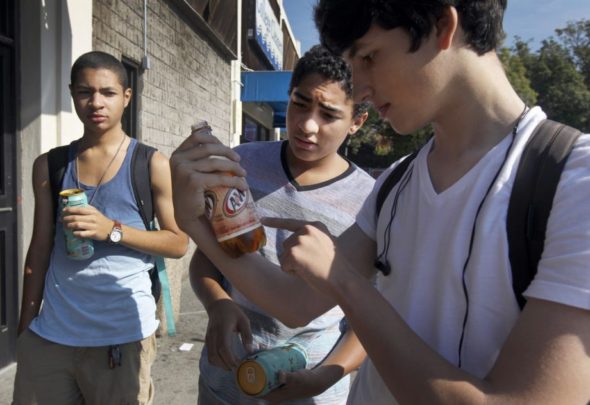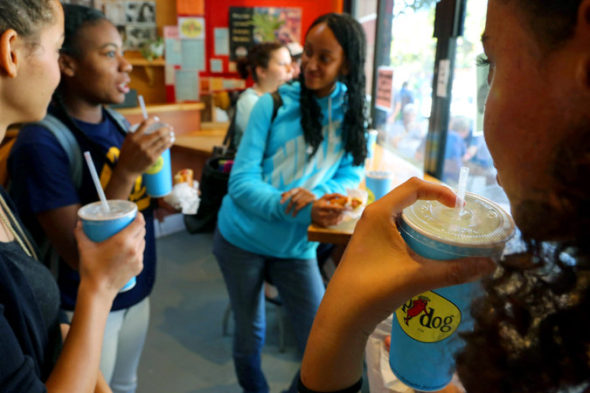redo Jump to...
print Print...

Maybeck High School students Zeke Gumora (left), Baijean Shine and Rory Cooper check the sugar content of their drinks outside a 7-Eleven in Berkeley. All said that they wouldn’t give up their sweet drinks no matter what the surcharge was. (Photo: Paul Chinn/The Chronicle, SFGate)
(by Heather Knight, San Francisco Chronicle) – San Francisco voters rejected [a ballot measure that would have imposed] a tax on soda and other sugary beverages on election day, but voters in Berkeley approved their own version, making the famously liberal bastion the first city in the country to adopt a controversial soda tax [a 1-cent-an-ounce tax on sugary sodas and energy drinks]. That adds about 12 cents to the price of a can of soda and about 68 cents to a two liter bottle.
[Results showed the Berkeley measure won 75% of the vote.]Proponents of both cities’ measures said sugar is fueling a worldwide obesity epidemic and contributing to a host of diseases, including diabetes, and that a tax on soda would make people think twice about drinking so much of it.
Opponents, including the…American Beverage Association, argued that the tax smacked of a “nanny state,” would hit low-income residents hardest because they drink the most soda, and would probably raise the cost of groceries for everybody. …
“San Franciscans have made it clear they can decide for themselves what to eat and drink,” said Roger Salazar, spokesman for the campaigns to defeat both taxes. “Despite being considered an extremely liberal city, voters in San Francisco share many of the same economic concerns as the rest of the American public.”
Martin Bourque, spokesman for the Berkeley soda tax measure, said of the landslide passage there: “What this shows is that a community can come together and fight for kids’ health regardless of the outrageous amounts of money spent against their interests. The tides have clearly turned on Big Soda.”
San Francisco Supervisor Scott Wiener, an author of Prop. E, said he was disappointed by the results in the city but was “very, very happy for Berkeley.”
The cities’ measures were crafted differently. San Francisco’s Proposition E would have levied a 2-cent-per-ounce tax on sodas and other sugar-sweetened drinks, including some juices, coffees and flavored waters.

Students from Berkeley High School at a restaurant near campus.(Photo: Jim Wilson/The New York Times)
The city’s economist said the tax would raise the price of soda by 23 to 36 percent and bring in $35 million to $54 million annually. The money would have gone to children’s nutrition and physical education programs. Because the tax revenues were pegged for a specific use, the measure needed two-thirds of voters to approve it. [It received support of nearly 55% of voters there, but fell short of the two-thirds super-majority vote needed for passage.]
Berkeley’s Measure D will levy a 1-cent-per-ounce tax on sodas and sugary drinks, and the money will go to the city’s general fund. Because the tax revenues weren’t intended for a specific purpose, the measure needed just a simple majority of voters to approve it. [Sugar sweetened beverages whose distribution would be subject to the tax would include high-calorie, low-nutrition products, like soda, energy drinks, and heavily presweetened tea, that contain at least 2 calories per fluid ounce.]
The American Beverage Association fought hard against the San Francisco measure, spending nearly $10 million on TV and radio advertising, billboards, campaign mailers, polls, political consultants and more. It also gave money to local political clubs, including the Harvey Milk LGBT Democratic Club and the San Francisco Republican Party, to produce slate card mailers listing their endorsements, including No on E. …
About 30 states and cities – including Richmond, California – have tried to pass soda taxes, but each one has failed until Berkeley bucked the trend last Tuesday. …
The industry also tied the tax to an increasing cost of living in the Bay Area. It warned that grocery bills would rise overall, not just on Coke and Pepsi, because the taxes would be levied on grocery stores, which could raise overall prices to pay the tax.
Proponents of soda taxes pointed to the great success of cigarette taxes in reducing the number of people who smoke.
Claire Brindis, director of the Institute for Health Policy Studies at UCSF, has said soda taxes are “a gentle way to try to help people begin to make wise choices in their environment.”
[Other opponents argued that the measure, which exempts 100% juice drinks, chocolate milk and diet sodas as well as some retailers who pick up beverages outside of city limits, “has too many loopholes, too many exemptions and too few safeguards.”Local opponents included movie theater and restaurant owners.
“We can’t tax our way to health with a measure that provides absolutely zero accountability in terms of how the revenue is spent,” argued opponents.]
Chronicle staff writer Wendy Lee contributed to this report.
Reprinted here for educational purposes only. May not be reproduced on other websites without permission from the San Francisco Chronicle. Visit the website at sfgate .com.
Questions
1. Regarding the city of Berkeley’s new tax on soda:
a) How much is the tax? Be specific.
b) What is taxed?
c) What isn’t taxed?
2. a) Define proponent.
b) For what reasons did proponents of the tax support this proposed law?
3. For what reasons did opponents vote against the tax?
4. If the majority of voters in both cities voted for their respective ballot measures, why did Berkeley’s pass and San Francisco’s fail?
5. Roger Salazar, spokesman for the campaigns to defeat the soda tax in Berkeley and San Francisco said, “San Franciscans have made it clear they can decide for themselves what to eat and drink.”
Claire Brindis, director of the Institute for Health Policy Studies at UCSF, has said soda taxes are “a gentle way to try to help people begin to make wise choices in their environment.”
With whom do you agree? Explain your answer.
Background
Before the election, Salazar dismissed the notion that the likely passage of the measure in Berkeley could create a domino effect in which other cities adopt soda taxes too.
“San Francisco is always where the big action is,” he said. “Berkeley is always an outlier. It’s a lot more affluent. It’s a lot more eclectic.
“I don’t think people would look at Berkeley’s results and say, ‘Oh, that’s what the rest of the country would do,’” he continued. “Berkeley is a city that gives away free pot to poor people. It’s not exactly mainstream.”
(The Berkeley City Council approved an ordinance in July requiring medical marijuana dispensaries to give away at least 2 percent of their product to very-low-income residents.)
(from the article above)
Resources
Berkeley’s ballot measure on soda tax (Measure D) passed:
ballotpedia.org/City_of_Berkeley_Sugary_Beverages_and_Soda_Tax_Question,_Measure_D_(November_2014)
San Francisco’s ballot measure on soda tax (Prop E) did not pass:
ballotpedia.org/City_of_San_Francisco_Sugary_Drink_Tax,_Proposition_E_(November_2014)
Watch a news report:
Daily “Answers” emails are provided for Daily News Articles, Tuesday’s World Events and Friday’s News Quiz.



